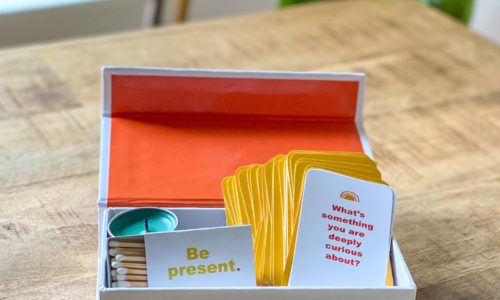Long before we ever started doing 360 Surveys (also called Three Stars and a Wish or Full Circle Surveys) at Acton Academy, we did them at home when our children were young…12, 6 and 5 years old. Our goal was to keep communication open and grow closer.
Our little family game had clear rules. Each person had a turn to leave the living room and sit in another room with the door closed. While that person was out of the room, the others would jot down two things they wanted that person to keep doing as a family member and one thing they wished that person would do more often. (This can be done out loud as a group discussion with one person writing down all the answers if that’s easier.) The main rule was to be kind and specific with our words.
After 5-10 minutes, the person would return to the living room and sit on the Hot Spot (a red throw pillow.) Their “answers” would be read aloud to them.
When each person had a turn, we’d retreat to the kitchen for a fabulous dessert to celebrate.
I was surprised how nervous this game made me. We parents are used to being the ones giving feedback to our children. It’s not usual to say, “Hey, how am I doing as your mom? What do you need more from me? Less?”
I had no idea what my children would say. My stomach churned as I sat alone waiting to find out.
My most poignant memory is the sweet pain I felt when I learned my stepdaughter had been wishing I would spend more time alone with her. I had always thought she wanted and needed space from me. I was wrong. I wouldn’t have learned this without creating space to hear it.
I never craved feedback until then. Now I know it is the fuel for my growth.
After this experience, Jeff and I wanted to inject more intentionality around giving and gaining feedback at Acton so all Eagles could fill their tanks with this rich fuel. Today, continual feedback is simply part of the Acton journey.
Some parents don’t like this process because it’s uncomfortable – or they project their own discomfort onto their Eagle’s experience.
But the Eagles understand the “why” and over time naturally ask for feedback often. For how else can they improve? How else can they become excellent? How else can they become good friends?
Recently a fellow Acton parent shared her story. She said her son was very upset after receiving his 360 scores. She wanted to email us and tell us how unfair and cruel this process is. He stopped her. He said, “Mom, the feedback is right. I’m just upset at myself. I want to get better.”
My hope is for my own children to have relationships that are grounded in openness to feedback. It’s simply part of the deal to grow into their best selves. I hope I can become better at it myself.


